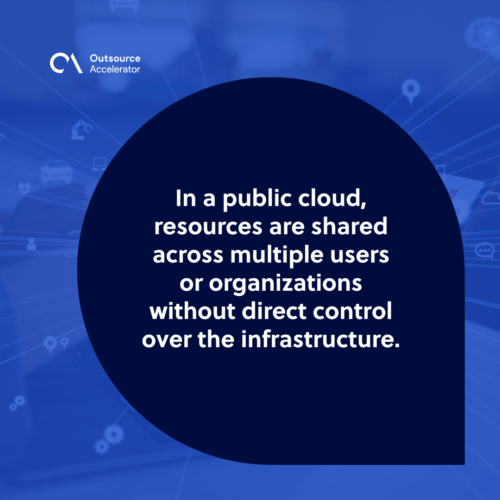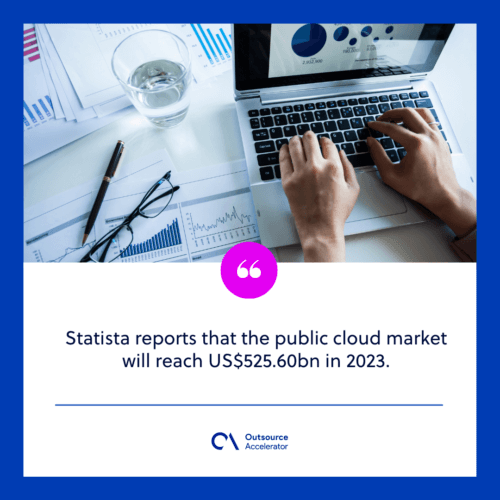Understanding public cloud: The basics and benefits

Cloud computing has become increasingly popular and has significantly impacted digital platforms. Among the different types of cloud computing, public cloud services have been a game-changer.
ScienceLogic, with data from the Hosting Tribunal, reported 94% of enterprises already use a cloud service. And public cloud infrastructure will grow at 35%. It shows organizations recognize the need to operate efficiently despite the location.
Understanding the public cloud is the key to unlocking its potential and realizing its benefits.
Let’s take a closer look at public cloud fundamentals.
What is a public cloud?
The term “cloud” has become widely associated with internet-based technologies that allow users to store, manage, and access data and applications. In essence, the cloud is a vast network of remote servers that operate as a single ecosystem.
In a public cloud, resources are shared across multiple users or organizations without direct control over the infrastructure. Instead, a public cloud provider owns and maintains the hardware, software, and networking infrastructure required to run the services.
Users access and use public cloud services over the internet, and they pay for only what they need.
Public cloud vs. Private cloud vs. Hybrid cloud
There are three main deployment models in cloud computing:
- Public
- Private
- Hybrid
While all three involve on-demand computing, their ownership, control, and resource access differ.
A private cloud is a virtual environment dedicated to a single organization. The sole entity owns and operates the cloud infrastructure. And it is typically available only to authorized users within the company.
In contrast, a third party owns and maintains public cloud infrastructure. Its resources are available to anyone who wants to use them.
A hybrid cloud is a combination of public and private cloud environments. It allows firms to take advantage of the benefits of both models. For example, sensitive or critical workloads can be hosted on a private cloud, while less critical workloads can be hosted on a public cloud.

How a public cloud works
Public cloud providers operate vast data centers with numerous servers, storage devices, and networking equipment. These resources are combined and virtualized to create a scalable and shared environment.
When an organization subscribes to a public cloud service, it uses a portion of this virtualized infrastructure. The provider is left with resource delivery, maintenance, and security. Therefore, a business can focus on using the services rather than managing the system.
Public clouds are accessed through a web-based interface or APIs (application programming interfaces). Users can allocate, configure, and manage their resources based on their needs.
Public cloud services
Public cloud services can be broadly classified into three categories:
Infrastructure-as-a-Service (IaaS)
IaaS provides users access to computing infrastructure such as virtual machines, storage, networks, and operating systems. You can deploy or run any software or application using its system.
Meanwhile, the cloud service provider manages the underlying hardware and infrastructure. The provider also cares for the data center, servers, storage, and networking.
Platform-as-a-Service (PaaS)
PaaS provides a platform to develop, run, and manage applications without worrying about the underlying infrastructure. The provider runs the infrastructure so users can focus on the code and the software application they are building.
Software-as-a-Service (SaaS)
SaaS gives access to software applications and solutions hosted on the cloud. Users do not need to install or manage the software, as it is already deployed and maintained by the provider. There’s access to the software over the internet on a pay-per-use basis.
Why use a public cloud?
Statista reports that the public cloud market will reach US$525.60bn in 2023. While its revenue is estimated to exhibit an annual growth rate of 13.81% by 2027.
Gartner also predicts that public cloud spending will reach almost $600 billion in 2023. This proves that more and more companies are recognizing the benefits of public cloud services.
One of the main advantages is its scalability. You can adjust the usage of resources based on specific needs. This means businesses can rapidly scale their operations and won’t need to invest in expensive hardware and infrastructure.
Leveraging a public cloud also allows greater flexibility and agility. You can access the services from anywhere, using any device with an internet connection. This allows firms to be more mobile and responsive to customer needs.
Additionally, these cloud services are cost-effective, as you only pay for what you use.

Public cloud security
Public cloud security is a paramount concern for organizations considering adopting cloud services.
Public clouds do offer robust security features, but it’s necessary to understand its shared responsibility model.
To ensure the security of their data and applications in a public cloud environment, companies should:
- Implement strong authentication mechanisms, like multi-factor authentication, to protect user accounts.
- Encrypt sensitive data to prevent unauthorized access.
- Regularly update and patch applications and operating systems to address security vulnerabilities.
- Monitor the cloud environment for suspicious activities or unauthorized access attempts.
- Establish and enforce access control policies to restrict privileges and limit exposure to potential threats.
- Conduct regular security audits to identify and remedy any vulnerabilities or weaknesses.







 Independent
Independent




